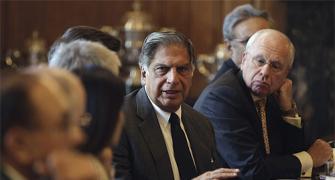India and Bangladesh on Monday signed a liberalised visa agreement and a landmark extradition treaty that would pave the way for the deportation of jailed United Liberation Front of Asom 'general secretary' Anup Chetia and other wanted criminals.
Home Minister Sushilkumar Shinde signed the agreement with his Bangladeshi counterpart Mohiuddin Khan Alamgir at the end of their bilateral talks, which also yielded a 'revised travel arrangement', under which New Delhi as well as Dhaka eased their visa regimes under several categories.
"These contracts will enhance ties in areas of security and people to people contacts," Sindhe told a joint press conference after signing the deals.
Earlier in the day, Cabinet Secretary Mohammad Mosharraf Hossain Bhuiyan had said the treaty will allow transfer of the convicted and under-trial criminals. But he said that the treaty would not be applicable for peoples accused of offenses of a political nature. It will be applicable to those facing charges like murders, culpable homicide and other serious offenses.
Shinde arrived in Dhaka as a follow-up of his Bangladesh counterpart's New Delhi tour in December.
The two countries agreed to ink the extradition treaty in December alongside an agreement to liberalise the visa regime. New Delhi had earlier promised to put in efforts to track down two absconding and convicted killers of Bangabandhu Sheikh Mujibur Rahman and hand them over to Dhaka, as two of them were believed to be hiding in India.
Alamgir last month told reporters in Delhi that "Bangladesh will keep its pledge (but) the matter is now pending before a court" when asked if Dhaka would return jailed ULFA leader Anup Chetia.
Home ministry officials in New Delhi say that the extradition treaty will pave the way for the deportation Chetia, Tripura insurgent leader Vishwa Mohan Deb Barman, NDFB leader Thulunga alias Tensu Narzery and many other insurgents from the north-east, who have been hiding in Bangladesh.
India has been pressing for Chetia's deportation since a long time. The ULFA leader has been in a Dhaka jail following his arrest in 1997 on the charge of entering Bangladesh without valid documents.
He had, however, moved court seeking asylum in Bangladesh for security reasons, making it legally difficult for Dhaka to execute New Delhi's demand.
The new visa pact will also remove restrictions on the visit of businesspersons, students, patients, senior citizens above 65 years and children below 12 years on the lines of the liberalised visa regime between India and Pakistan.
Under the student visa, a person can avail a one-year multiple entry travel document.
India has also agreed to waive the 60-day cooling off period for the second visit by a Bangladeshi national. The restriction is at present applicable to citizens of Pakistan, China and some other countries.







